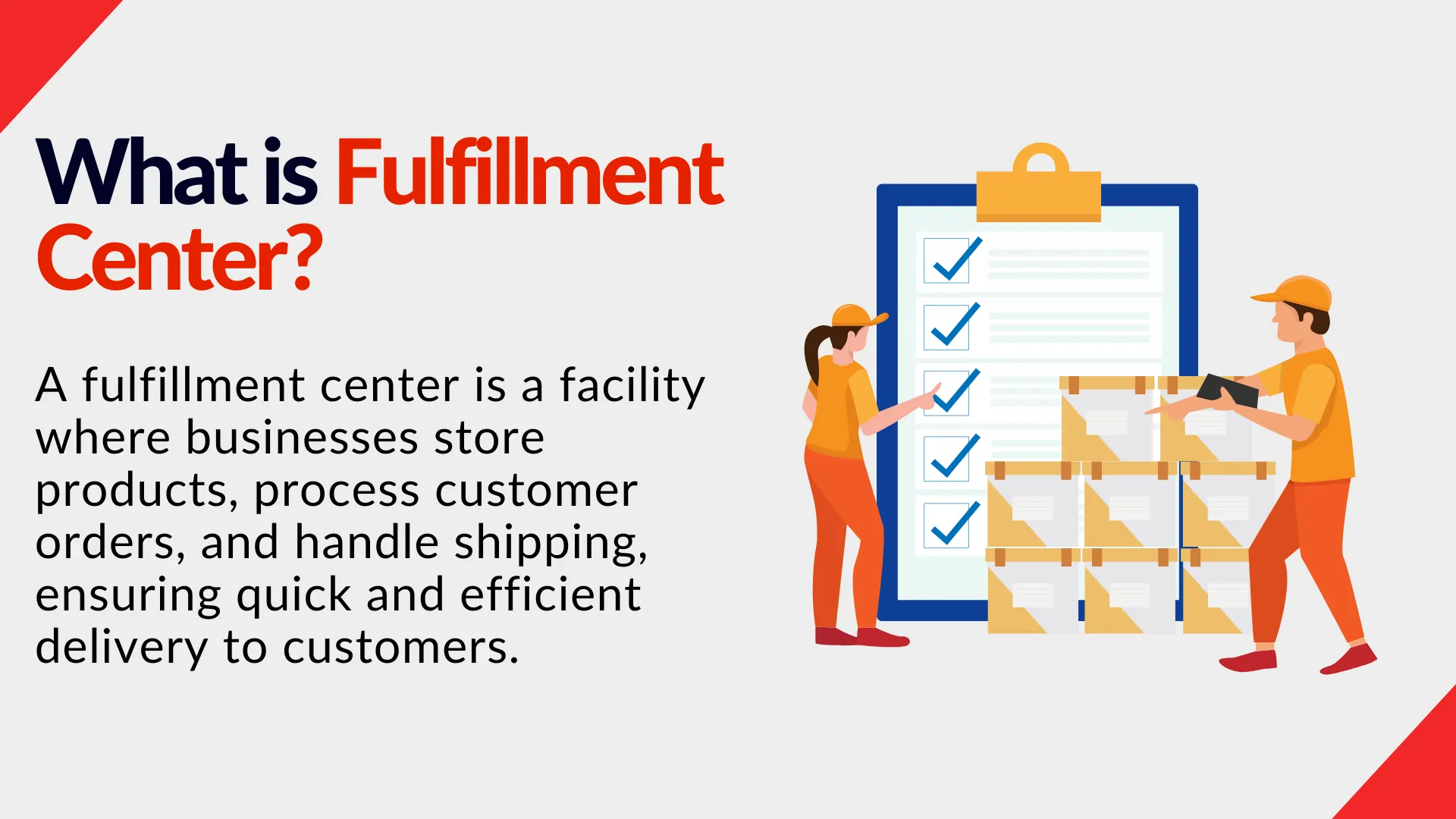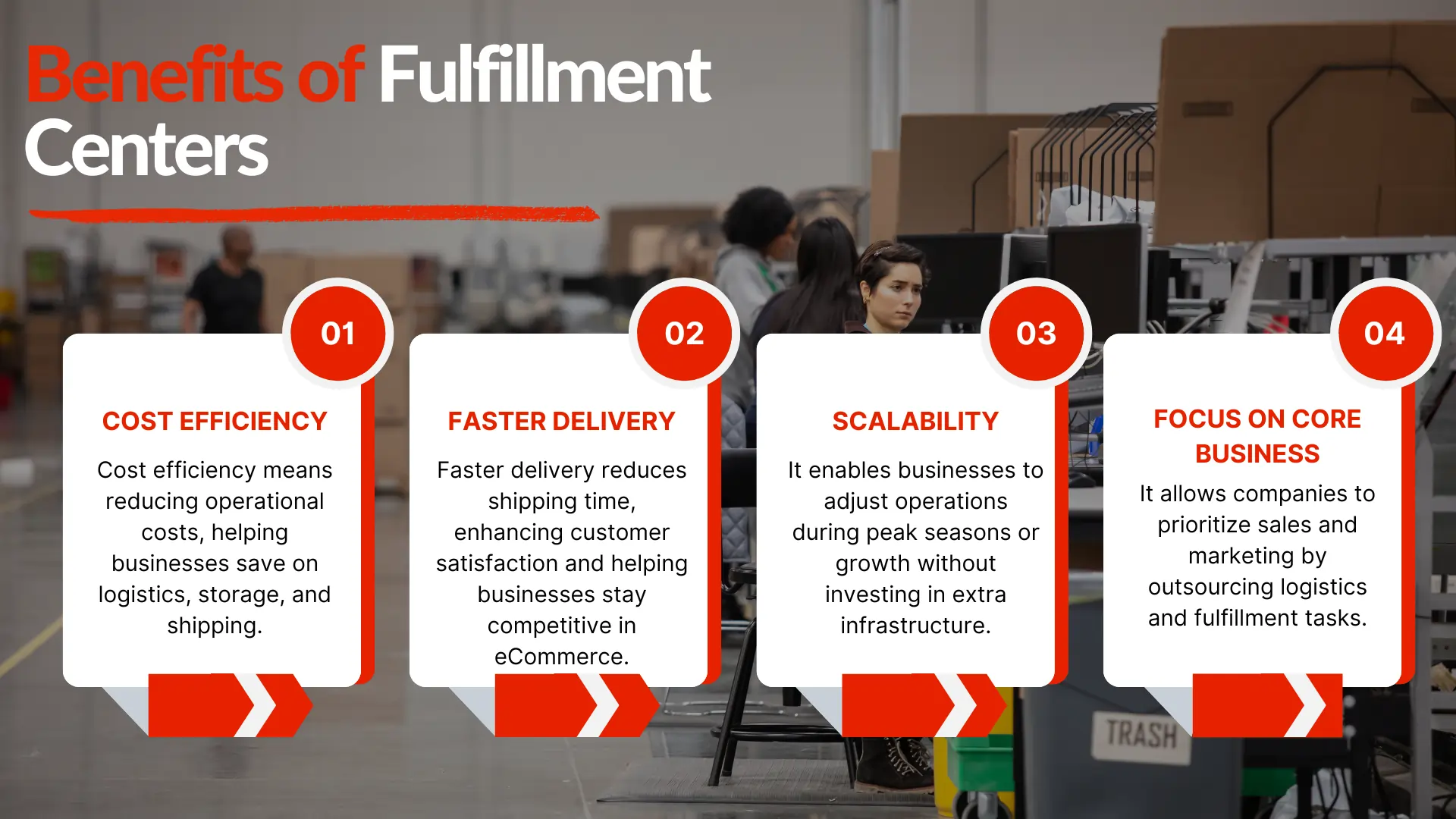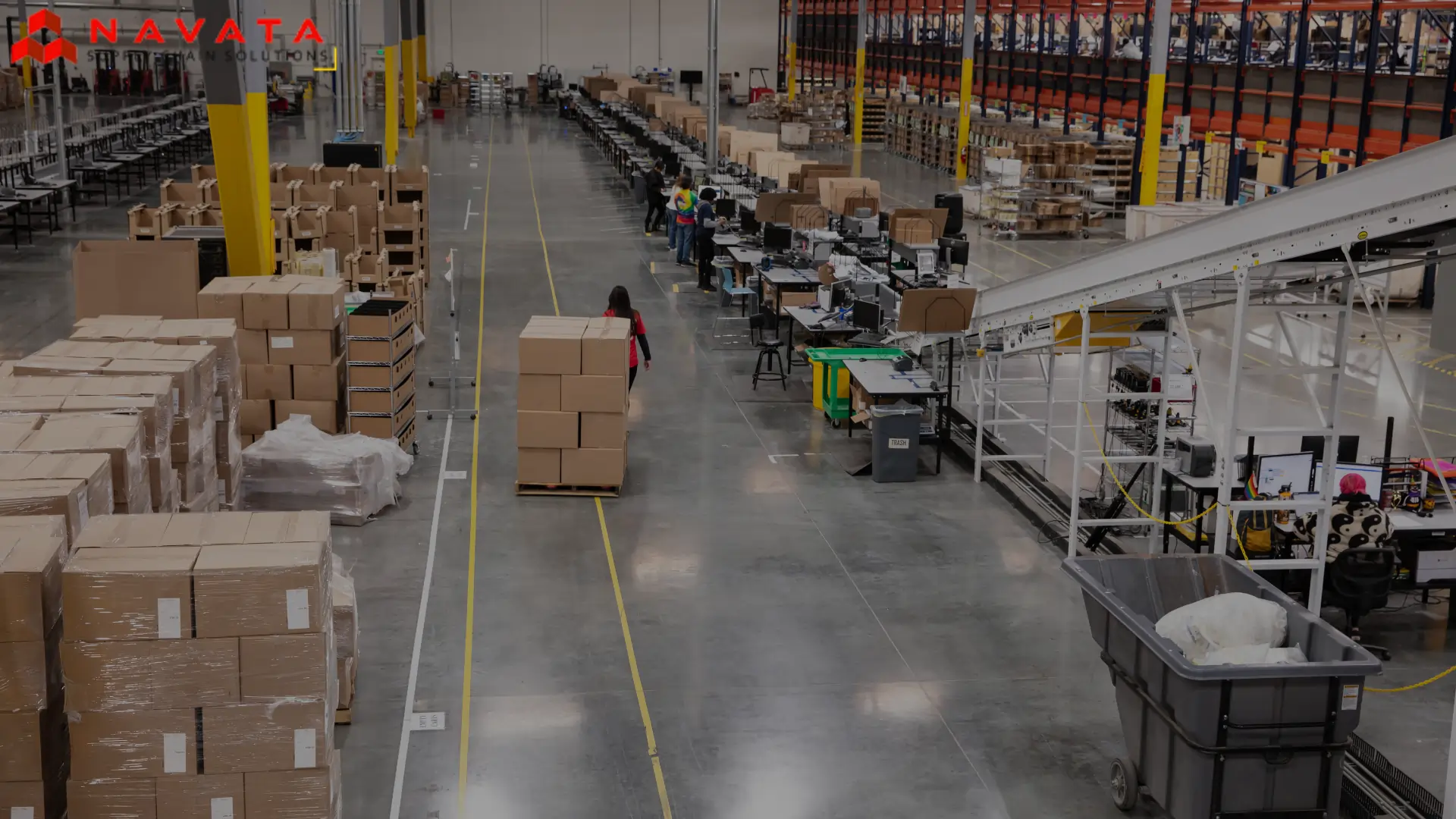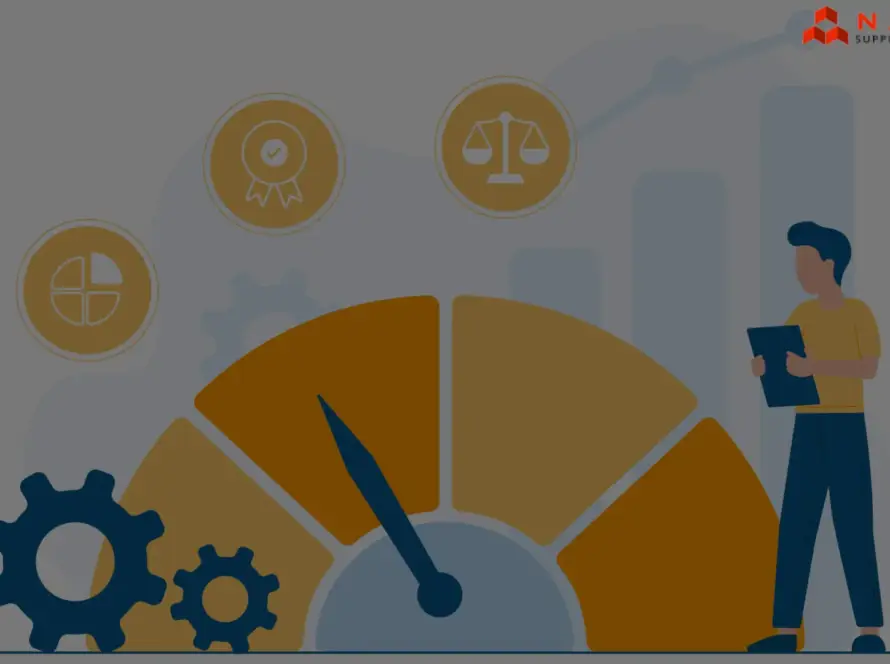What is Fulfillment Center?
A fulfillment center is a facility where businesses store their products, process customer orders, and manage shipping. When a customer places an order online, the fulfillment center steps in to pick, pack, and ship the items directly to the buyer. It’s like the middle point between a business and its customers, ensuring that products are delivered quickly and efficiently.
In today’s fast-paced eCommerce world, fulfillment centers play a crucial role. With the rise of online shopping, customers expect faster delivery times, and businesses rely on fulfillment centers to meet these expectations. They help companies save time and money by handling logistics, allowing businesses to focus on growth. Fulfillment centers also improve the supply chain by streamlining processes, from managing inventory to handling returns. Their ability to scale and optimize operations makes them essential for modern businesses looking to compete in the ever-evolving online marketplace.

Functioning of Fulfillment Centers
A fulfillment center is particularly helpful in order management including order reception, stocking, packing, and even dispatching on behalf of a business.
Order Processing:
In the online ordering, the order details reach the fulfillment center and the process continues from there. This entails selecting the right item, wrapping and getting them ready for dispatch. The center also guarantees that orders are fulfilled rightly to meet delivery requirements.
Storage:
Fulfillment centers store products for businesses in an organized way. For the products that are small in size, the inventory is stored on shelves, bins or pallets. This allows businesses to have readily available stock without the need of their own warehouse, helping them manage high demand, especially during peak seasons.
Shipping:
After the order has been packed, the fulfillment center arranges with the shipping companies or local courier services to deliver the product to the customer. They are in charge of every step in shipping right from the packing of the consignment, to the pick up of the consignment, guaranteeing timely, efficient delivery.
Handling Returns:
It is an important function of fulfillment centers that helps to keep customers satisfied. When a customer returns a product, the fulfillment center takes over to manage the process efficiently. This often includes receiving the returned item, checking it for damage, replenishing it if it is still sellable, and updating the inventory.
You May Also Like To Read: What is Final Mile Logistics?
Technology Behind Fulfillment Centres
Warehouse Management System:
WMS is used primarily when there is a need to manage and control everyday processes in a fulfillment centre. It aids in inventory management, identification of stock placement and order management. It helps to ensure that only the right product is picked, packed, and shipped in the right manner, without many mistakes. A few of the advantages of WMS include; real-time updating of the inventories by letting the business know what is available in the storeroom to prevent cases of either overstocking or a situation where goods are out of stock.
Robotics and Automation:
Automation is currently revolutionizing today’s fulfillment centre enhancing the overall speed and quality. Robotic picking, conveyor systems as well as packaging equipment lower the amount of manual handling and work execution. That is why robotics can be used to perform repetitive operations, for example, to sort and transport products where the level of human error is undesirable. This contributes to a faster fulfillment of customer’s orders which in return sees enhanced order order and speed.
Real-time Tracking:
Real-time Tracking Integration with eCommerce Platforms enhance efficiency by providing live updates on order status, from when it’s placed to when it’s shipped. Consequently, the integration of third-party 3PL ensures that the fulfillment centre receive the orders instantly and process them with greater efficiency. This visibility across the entire supply chain not only makes internal processes better but also ensures customers are informed with the correct delivery time hence enhancing their experience and satisfaction.
You May Also Like to Read: What is Warehouse Management System (WMS)?

Benefits of Fulfillment Centers
Cost Efficiency:
Fulfillment centers are useful for companies to reduce their delivery and operational expenses. This way they can keep the products closer to customers and they also work with many shipping companies to have better shipping prices. Also, businesses cut costs on warehousing, staffing, and packaging costs, as these are all provided by the fulfillment centers.
Faster Delivery:
This means that with the fulfillment centers located near the markets, delivery time is greatly enhanced. This helps in addressing the increasing customer expectation on faster delivery services hence enabling business organizations to be relevant in the modern fast-paced e-commerce market.
Scalability: Fulfillment centers allow businesses to expand during the end of year rush or other special occasions without having to purchase more equipment. In general, fulfillment centers are ready for increased sales volume whether it is the end of the year shopping or when there is a sudden influx of orders.
Focus on Core Business:
Another advantage of using the services of a fulfillment center is that it frees up the business to do what it does best, which is marketing, selling, and creating products. By reducing the amount of time and money spent on managing warehouses and shipping, the companies can focus on marketing and enhancing the customer experience.
Disadvantages of Fulfillment Centers
While fulfillment centers provide numerous benefits to businesses, they also present certain problems that organizations must be aware of in order to fully benefit from them.
Dependence on Third Parties:
Outsourcing fulfillment entails relying on external partners to handle shipping and customer care. This can limit your control over critical factors such as delivery delays, packing quality, and managing consumer inquiries, thus harming your brand’s reputation.
Expense Considerations:
While fulfillment centers can help save money on logistics and storage, they are not without expense. For small businesses, the costs of storing, packing, and shipping can add up, so it’s critical to assess these prices against the expected benefits to ensure they fit inside your budget.
Complexity:
Integrating your business with a fulfillment center’s technologies might be challenging. Syncing inventory, orders, and returns between your eCommerce platform and the fulfillment center’s system necessitates meticulous management, and any miscommunication can interrupt the process.
Error Risk:
Despite technical developments, mistakes such as wrong shipping or delayed items do occur. Errors in picking, packing, or shipping can result in unsatisfied customers, thus continual oversight and quality checks are critical.
Hey Looking For Fulfillment Solutions! We are Just a Click Away
Choosing the Right Fulfillment Centre for Your Business
When choosing the right fulfillment center for your business, consider the following key factors:
Location:
The more localized your fulfillment center is, the quicker and cheaper it will be to get your products to your customers. Choose a location that is convenient in terms of reaching customers or other distribution points to ensure fast delivery and less expenses.
Technology:
It is necessary for a fulfillment center to include Warehouse Management Systems (WMS) and automation instruments in its operations. Having real-time inventory control, order processing, and synchronization with the eCommerce store are crucial to the supply chain visibility.
Shipping Options:
Assess the shipping partners and the available shipping options of the center. Are the shipping options available safe and affordable as well as fast? Are they capable of completing local and international deliveries? Availability of multiple shipping options is one way of meeting the customer expectations.
Reputation:
Check out the dependability of the fulfillment center and the quality of their services. Read reviews and testimonials and their experience in handling logistics as a good fulfillment center will help reduce problems such as delays or mistakes.
Business size and growth potential are the most important considerations when evaluating a fulfillment center. Small scale enterprises may focus on cost and capacity to accommodate the growing number of orders that the center will process as the business expands. Large organizations are likely to have more than one fulfillment center and the need to invest in technology systems to handle the increased volume. Ensure the fulfillment center you choose is strategic for your business’s growth and can accommodate your current operations and future growth.

Conclusion
Finally, fulfillment centers assist businesses handle their logistics more efficiently. They handle everything from order processing and storage to shipping and refunds, letting businesses to focus on expanding their operations. Fulfillment centers use advanced technology such as WMS, automation, and real-time tracking to enable faster and more accurate deliveries, resulting in higher customer satisfaction.
While they provide numerous benefits, firms should be aware of potential drawbacks, such as cost considerations and dependency on third parties. Businesses who understand both the benefits and limitations of fulfillment centers may make the most of them and improve their operations for long-term success.
Thanks For Reading: What is Fulfillment Center and How do they work?
Powered By 360Presence

